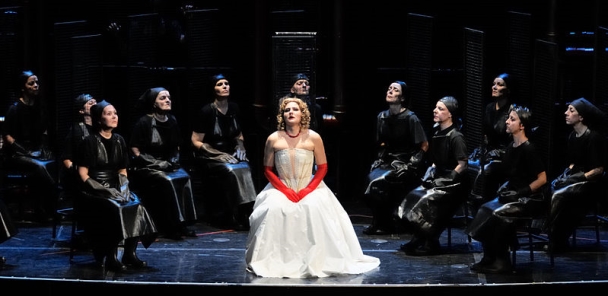
October 19, 2015, by Helen Lovatt
Lady Macbeth of Mtsensk — or should that be Medea?
Helen Lovatt reflects on intertextuality and a trip to the opera (and continues to see Argonauts everywhere).
Last week I experienced the theatrical pounding of Shostakovich’s Lady Macbeth of Mtsensk in a sensational and vivid production by the ENO. Get a flavour of it on youtube here. I do like a text that puts its intertextuality on display in the title. But is Lady Macbeth the best intertextual paradigm? [Spoilers ahead.]
The story features the wife of a flour merchant, Katerina, bored, depressed and tyrannised by her husband’s father, who ends up in bed with an employee (Sergei) who has recently arrived at the factory. The father-in-law catches them together, and gets his men to administer a severe beating. It’s looking likely that Sergei might get killed in due course. But Katerina intervenes by poisoning the father-in-law and rescuing Sergei. She tells him she will make him king of the business and her lawful husband (the ruthless ambition on behalf of her beloved is the bit most like Lady Macbeth, along with the willingness to murder people, of course). But her actual husband Zinovy returns unexpectedly, starts threatening Katerina, at which point Sergei ambushes him and she kills him. They are in the midst of their wedding day, all plans come to fruition, when the police break in and take them off to jail. The last scenes go beyond the Macbeth story: in prison, Sergei now hates Katerina, and has a new lover. He uses Katerina’s money to get what he wants, and in the face of his betrayal, Katerina’s violence explodes and she kills both the new lover and herself.
Why does she strike me as more like Medea than Lady Macbeth? First, she betrays her family and position of privilege for an outsider, and as a result ends up isolated and ostracised. Zinovy’s father is rather like Aeetes in his anger and violence. The killing of Zinovy is particularly reminiscent of the killing of Medea’s brother Apsyrtos in Apollonius. Apsyrtos is there to bring her back to face her father after the initial betrayal of helping Jason to steal the golden fleece. He’s a threat and they lure him into an ambush and kill him together. There is a great deal of emphasis on the disposal of the corpse and the pollution suffered by the killers in both stories.
Sergei is very much like Jason: a chancer, a womaniser, who has done all this many times before, and is fundamentally out for profit and gain, playing on the emotions of his lover to get what he wants. Katerina commits her first act of violence and betrayal in response to the fact he is in danger. The rat poison used to kill the father-in-law might evoke Medea’s abilities with drugs. When Katerina is no longer useful, he discards her. She doesn’t destroy him, but rather her female rival and herself (taking Medea’s children as figuratively standing in for herself). Both Sergei and Jason survive.
Of course, Medea is like Lady Macbeth: a powerful, ambitious woman who aids her man to achieve his goal. But Lady Macbeth is already married to Macbeth, and is driven by the desire for power. Both Katerina and Medea are driven not by power, but by love, to risk the privilege they already have. Katerina and the Medea of Euripides also explicitly struggle against female roles, attitudes to women and patriarchal society. Perhaps labelling her Medea would have revealed the ambivalence of the text’s attitude to Katerina: Lady Macbeth is not someone for whom we feel much sympathy, while Medea is rather more complex, a victim as well as a monster. This comparison also brings out for me how much the later part of the Medea story (especially the child-killing) has come to epitomise Medea, even though it may all be a Euripidean innovation.
Youtube trailer of the ENO production:
Cover image: Lady Macbeth of the Mtsensk District at Teatro Comunale di Bologna, December 2014, Svetlana Sozdateleva as Katerina L’vovna Izmailova, Director Dmitry Bertman, Helikon Opera Moscow, photo by Lorenzo Gaudenzi – Own work. Licensed under CC BY-SA 4.0 via Commons.
No comments yet, fill out a comment to be the first

Leave a Reply